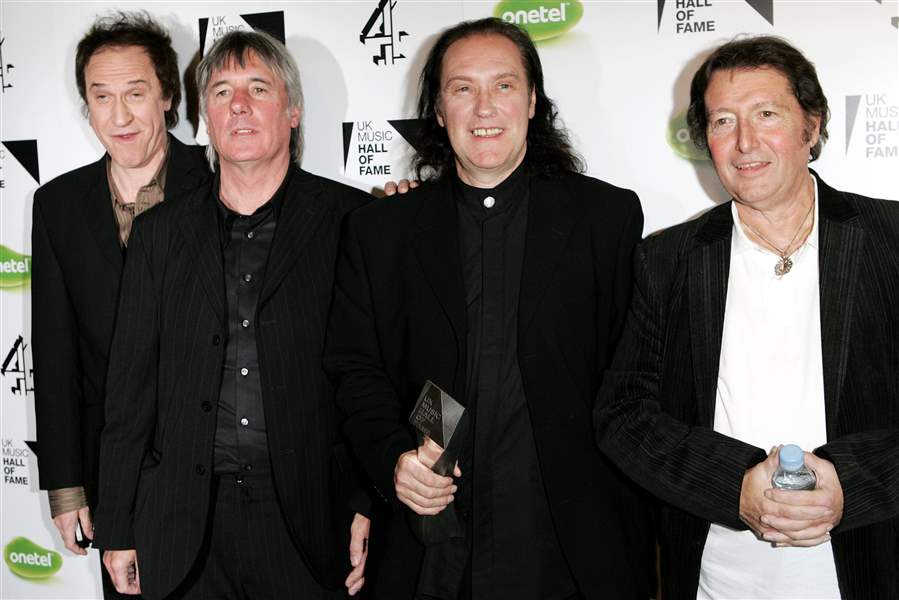
BOOK REVIEW
The Kinks’ influence endures around the world
4/16/2017
The Kinks band members Ray Davies, left, Mick Avory, Dave Davies, and Peter Quaife backstage with the award for their induction into the UK Music Hall Of Fame in 2005.
Getty Images
Call it aesthetic contrarianism or even reverse snobbery, but I tend to prefer artists and works that most fans relegate to second place or lower: Buster Keaton’s movies above Charlie Chaplin’s, Krazy Kat rather than Peanuts, the acting of Barbara Stanwyck over that of Katharine Hepburn, Carl Nielsen’s symphonies instead of Gustav Mahler’s. And in my pantheon, the Kinks come ahead of the Beatles, the Rolling Stones, and the Who.
The case for the Kinks goes something like this: They invented the power chord, notably in their first big hit, “You Really Got Me” (1964), and helped pioneer the concept album with Arthur (1969).
More than their peers, they engaged in satire and social criticism, starting in 1965 with “A Well Respected Man.” Three years later, they got the jump on the modern environmental movement with their album The Kinks Are the Village Green Preservation Society.
Their hit “Lola” (1970) injected sexual ambiguity into rock. Their songs have been covered and re-covered by groups from the Pretenders to Van Halen, and crop up frequently as themes in TV ads and series. Their paean to Englishness, “Waterloo Sunset,” was performed in the closing ceremony of the 2012 Olympics.
They’ve been so prolific that no one seems to know exactly how many albums to credit them with. Even Carey Fleiner, the author of this new study of the group, fudges the score: “The Kinks released nearly three-dozen official albums between 1964 and 1996.”
That adds up to hundreds of original songs on too many topics to keep track of. As explained by one of the fans contacted by Fleiner, “If you like the Kinks, then it’s as if you like 367 different bands.” (Newcomers should start with the two-CD album Kinks: the Ultimate Collection.)
Some things, however, we can say with certainty. The core of the group has been the brothers Ray and Dave Davies, born — in 1944 and ’47, respectively — and raised in London.
Oddly for creative children of working-class parents, they had a happy childhood; true, at age 12 Ray was sent to a school for emotionally disturbed kids, but his governing fear seems to have been that the family idyll “couldn’t last forever.” Ray attended art school, where his nonconformity allowed him to fit right in.
When the Kinks became part of the British Invasion, an influential cadre of Americans treated them as literal invaders.
The American Federation of Television and Radio Artists took exception to the Kinks’ onstage rowdiness, and the federal government accepted the union’s recommendation to deny the Kinks permission to perform in the United States.
The ban lasted from 1965 to ’69, cutting the Kinks off from publicity and income they could very much have used and putting them at a disadvantage vis-à-vis the Beatles, etc.
Fleiner argues, however, that the feds performed an unwitting service for the band by turning it inward. While the Beatles went into global overdrive and the Stones recycled American blues, the Kinks cultivated the English roots that have served them so well.
They also created characters: the aforementioned Well-Respected Man, Arthur and Lola, along with Dandy, Mister Pleasant, Plastic Man, Johnny Thunder, Wicked Annabella (each featured in an eponymous song), and more.
Although most of their songs were written by Ray, who usually sang lead, Dave contributed some memorable cuts, including “Death of a Clown” and “Strangers.”
But the band was plagued by the Davies’ sibling rivalry, a condition exacerbated by their position as the last-born of eight children, the rest of whom were female — Ray was all those sisters’ darling until Dave came along and ousted him.
The Kinks last performed together in 1996. Rumors of a reunion circulate from time to time, but so far it’s been no-no-no-no-no-la.
Fleiner, who teaches Classics at the University of Winchester, has given us not a bio of the band, but rather a series of linked essays on such subjects as the marketing of the Kinks and their sense of humor. For the most part, she is astute, but occasionally she overreaches.
Regarding “David Watts,” the Kinks’ irresistibly catchy portrait of schoolboy envy, she writes that “the song is peppered with ‘fa fa fa fa’s,’ a parody of affected middle- and upper-class speech.” Possibly, but let me suggest a simpler explanation.
The ultra-lyrical Kinks took every opportunity to sprinkle fa fa fa’s, la la la’s, and do do do’s into their songs. (See “Lola,” “Waterloo Sunset,” “Wonderboy,” and “Death of a Clown.”) What Fleiner takes for a parody may be just one more application of the greatest nonsense syllabary in the annals of rock.
But if readers close the book still looking for a handle on the Kinks’ protean artistry, perhaps that’s for the best. Carey Fleiner has left us to work out our own Kinks.